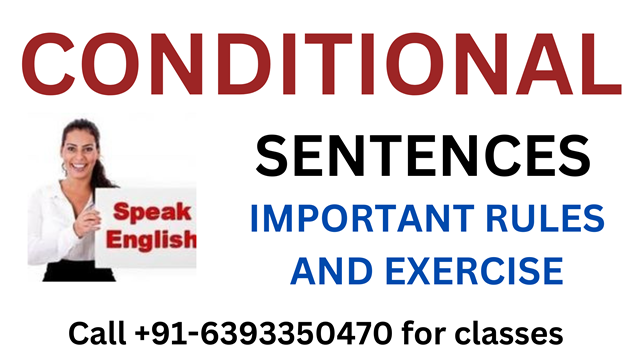Conditional Sentences Rules and Exercise

Conditional sentences are used to express situations that are dependent on a condition being met. They often follow an "if-then" structure. There are four main types of conditional sentences in English: zero, first, second, and third conditionals. Each type has its own rules and uses.
1. Zero Conditional
Form: If + present simple, present simple
Use: Used for general truths or laws of nature.
Examples:
If you heat water to 100 degrees Celsius, it boils.
If it rains, the ground gets wet.
2. First Conditional
Form: If + present simple, will + base verb
Use: Used for real and possible situations in the future.
Examples:
If it rains tomorrow, we will cancel the picnic.
If you study hard, you will pass the exam.
3. Second Conditional
Form: If + past simple, would + base verb
Use: Used for hypothetical or unlikely situations in the present or future.
Examples:
If I won the lottery, I would buy a big house.
If I were you, I would apologize.
4. Third Conditional
Form: If + past perfect, would have + past participle
Use: Used for hypothetical situations in the past that did not happen.
Examples:
If I had known about the meeting, I would have attended.
If they had left earlier, they would have caught the train.
Mixed Conditionals
Mixed conditionals combine elements of the second and third conditionals to express a present result of a past condition or a past result of a present condition.
Present result of a past condition:
Form: If + past perfect, would + base verb
Example: If I had studied harder, I would have a better job now.
Past result of a present condition:
Form: If + past simple, would have + past participle
Example: If she were more careful, she wouldn't have had the accident.
Key Points to Remember:
Zero Conditional: Use for general truths.
First Conditional: Use for real, possible future situations.
Second Conditional: Use for hypothetical, unlikely present or future situations.
Third Conditional: Use for hypothetical past situations that did not occur.
Mixed Conditionals: Use for connecting past conditions with present results or present conditions with past results.
Understanding and using these structures correctly will help you express conditions and their results clearly in English.
Question 1
Sentence: Despite of (A) the heavy rain, the match continued (B) till late in (C) the evening. (D)
Error: (A)
Correction: "Despite the heavy rain, the match continued till late in the evening."
Explanation: The word "despite" should not be followed by "of." It is used directly before the noun phrase without "of."
Question 2
Sentence: She does not (A) like the way how (B) he talks to (C) her friends. (D)
Error: (B)
Correction: "She does not like the way he talks to her friends."
Explanation: The phrase "the way" already implies "how," so "how" is redundant and should be removed.
Question 3
Sentence: If I was (A) the principal, I would (B) make several changes (C) in the school policies. (D)
Error: (A)
Correction: "If I were the principal, I would make several changes in the school policies."
Explanation: In conditional sentences expressing hypothetical situations, "were" is used instead of "was" with "I."
Question 4
Sentence: Each of the boys (A) in the class have (B) submitted their (C) assignments on time. (D)
Error: (B)
Correction: "Each of the boys in the class has submitted their assignments on time."
Explanation: "Each" is singular, so the verb should be "has" instead of "have."
Question 5
Sentence: He enjoyed (A) to read (B) books about (C) ancient history. (D)
Error: (B)
Correction: "He enjoyed reading books about ancient history."
Explanation: After the verb "enjoy," a gerund ("reading") should be used, not an infinitive ("to read").
Question 6
Sentence: The committee (A) are planning (B) to hold (C) a meeting next week. (D)
Error: (B)
Correction: "The committee is planning to hold a meeting next week."
Explanation: "Committee" is a collective noun and should be treated as singular, so "is" should be used instead of "are."
Question 7
Sentence: Neither the manager (A) nor his assistant (B) were (C) available for (D) the meeting.
Error: (C)
Correction: "Neither the manager nor his assistant was available for the meeting."
Explanation: When using "neither...nor," the verb agrees with the subject closest to it, which is "assistant" (singular), so "was" should be used.
Question 8
Sentence: The teacher asked (A) the students if (B) they could (C) discuss about (D) the project.
Error: (D)
Correction: "The teacher asked the students if they could discuss the project."
Explanation: The verb "discuss" does not require the preposition "about." It is used directly with the object.
Question 9
Sentence: He is one of those (A) who wants (B) to make a difference in (C) the society. (D)
Error: (B)
Correction: "He is one of those who want to make a difference in the society."
Explanation: The relative pronoun "who" refers to "those," which is plural, so the verb should be "want" instead of "wants."
Question 10
Sentence: The book (A) which you gave me (B) is (C) more interesting than (D) any book I have ever read.
Error: (D)
Correction: "The book which you gave me is more interesting than any other book I have ever read."
Explanation: "Any book" suggests a comparison with all books, including the one being talked about, which is illogical. "Any other book" excludes the book being compared.
Question 11
Sentence: She said that (A) she would rather (B) not to attend (C) the meeting tomorrow. (D)
Error: (C)
Correction: "She said that she would rather not attend the meeting tomorrow."
Explanation: After "would rather," the base form of the verb should be used without "to."
Question 12
Sentence: The movie (A) that we watched (B) last night was (C) too much (D) interesting.
Error: (D)
Correction: "The movie that we watched last night was very interesting."
Explanation: "Too much" is used for uncountable nouns, but here "very" should be used to describe "interesting."
Question 13
Sentence: Everyone (A) are required to (B) submit their (C) reports by Friday. (D)
Error: (A)
Correction: "Everyone is required to submit their reports by Friday."
Explanation: "Everyone" is singular, so the correct form is "is" instead of "are."
Question 14
Sentence: He is knowing (A) the answer, (B) but he is (C) hesitant to say it out loud. (D)
Error: (A)
Correction: "He knows the answer, but he is hesitant to say it out loud."
Explanation: The verb "know" is a stative verb and does not typically take the continuous form. "Knows" is the correct form.
Question 15
Sentence: Hardly had (A) he left the house (B) when it starts (C) to rain heavily. (D)
Error: (C)
Correction: "Hardly had he left the house when it started to rain heavily."
Explanation: The past perfect "had left" should be followed by the simple past "started."
Question 16
Sentence: The sceneries (A) in this part of (B) the country is (C) truly breathtaking. (D)
Error: (A)
Correction: "The scenery in this part of the country is truly breathtaking."
Explanation: "Scenery" is an uncountable noun and should not be pluralized as "sceneries."
Question 17
Sentence: The board of directors (A) have approved (B) the new policy (C) for all employees. (D)
Error: (B)
Correction: "The board of directors has approved the new policy for all employees."
Explanation: "Board of directors" is a collective noun and is treated as singular, so "has" should be used.
Question 18
Sentence: She looks forward (A) to meet (B) her friends (C) during the holidays. (D)
Error: (B)
Correction: "She looks forward to meeting her friends during the holidays."
Explanation: The correct form after "looks forward to" is the gerund ("meeting"), not the infinitive ("to meet").
Question 19
Sentence: Neither of the two options (A) were (B) satisfactory (C) to the committee. (D)
Error: (B)
Correction: "Neither of the two options was satisfactory to the committee."
Explanation: "Neither" is singular, so the verb should be "was" instead of "were."
Question 20
Sentence: The teacher as well as (A) the students have (B) been invited to (C) the annual function. (D)
Error: (B)
Correction: "The teacher as well as the students has been invited to the annual function."
Explanation: When "as well as" is used, the verb agrees with the first subject ("teacher"), which is singular.
Question 21
Sentence: Despite he was (A) tired, he (B) continued to work (C) late into the night. (D)
Error: (A)
Correction: "Despite being tired, he continued to work late into the night."
Explanation: "Despite" should be followed by a gerund ("being") or a noun phrase, not a clause.
Question 22
Sentence: The principal (A) and the teacher (B) was present (C) at the meeting. (D)
Error: (C)
Correction: "The principal and the teacher were present at the meeting."
Explanation: When two subjects are connected by "and," the verb should be plural ("were" instead of "was").
Question 23
Sentence: He is one of (A) the best student (B) that has ever (C) attended this school. (D)
Error: (B)
Correction: "He is one of the best students that has ever attended this school."
Explanation: "One of the" should be followed by a plural noun ("students" instead of "student").
Question 24
Sentence: She suggested (A) that we should go (B) for a walk (C) to the park. (D)
Error: (B)
Correction: "She suggested that we go for a walk to the park."
Explanation: After verbs like "suggest," "recommend," "insist," etc., the base form of the verb (subjunctive) is used without "should."
Question 25
Sentence: He was so (A) exhausted that he (B) could barely (C) walk any further. (D)
Error: (D)
Correction: "He was so exhausted that he could barely walk any farther."
Explanation: "Further" is used for abstract ideas or for distance when it means "more." "Farther" is used for physical distance.
These additional error-spotting exercises can further aid in refining your grammatical skills and preparation for competitive exams.
We hope that you must have found this exercise quite useful. If you wish to join online courses on Networking Concepts, Machine Learning, Angular JS, Node JS, Flutter, Cyber Security, Core Java and Advance Java, Power BI, Tableau, AI, IOT, Android, Core PHP, Laravel Framework, Core Java, Advance Java, Spring Boot Framework, Struts Framework training, feel free to contact us at +91-9936804420 or email us at aditya.inspiron@gmail.com.
Happy Learning
Team Inspiron Technologies

Leave a comment